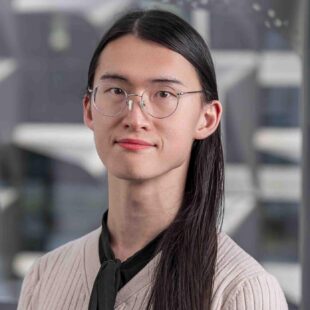Binxu Wang
Kempner Research Fellow
She/They

Contact Information
Subjects I Teach:
- Computational Neuroscience
- Vision
- ML Methods
Areas I Research:
About
Binxu Wang grew up in Beijing, China, and pursued undergraduate studies majoring in Physics at Yuanpei College, a liberal arts college in Peking University. There, Binxu engaged in extensive coursework across mathematics, philosophy, and psychology. Under the mentorship of computational neuroscientist Louis Tao, Binxu derived theories of feedforward network and visual population code. In 2018, Binxu moved to the United States to join the Neuroscience PhD program at Washington University in St. Louis. Working in the Carlos R. Ponce lab, Binxu focused on studying visual representations in the primate ventral stream, integrating insights from differential geometry and the interpretability research of deep neural networks. Utilizing advanced generative models and optimization techniques, Binxu and the team synthesized optimal features for neurons and explored their tuning geometry on image manifolds. With the relocation of the Ponce lab to Harvard Medical School in fall 2021, Binxu also moved to Boston. In the fall of 2023, Binxu earned a PhD in neuroscience and began a new journey as a member of the inaugural cohort of Research Fellows at the Kempner Institute at Harvard University.
Research Focus
Binxu’s current research focuses on visual neuroscience, generative models, and mechanistic interpretability. In the realm of neuroscience, Binxu’s focus is primarily on the neural representations in visual cortices, with a special interest in their dynamic and “generative” aspect. In the field of artificial intelligence, their interest lies in the science of representation learning. This involves understanding how representations emerge in computational systems depending on their training data and objective, and also their relationship to the biological neural representations. Further, Binxu is focused on gaining a deeper insight into generative models, from both normative and mechanistic perspectives. This includes understanding the optimal inductive biases for generative models and how their “neural circuits” implement the generative capabilities. Ultimately, Binxu’s goal is to draw parallels and establish connections between these computational models and the generative faculties inherent to the brain.



